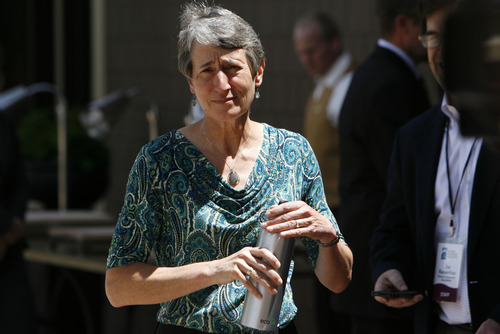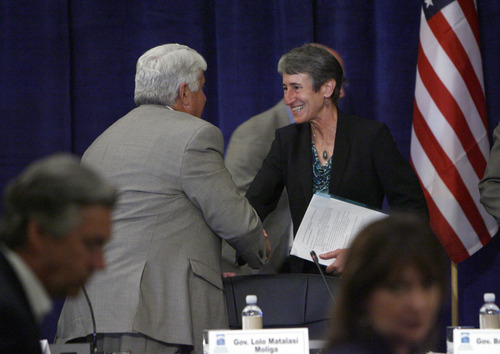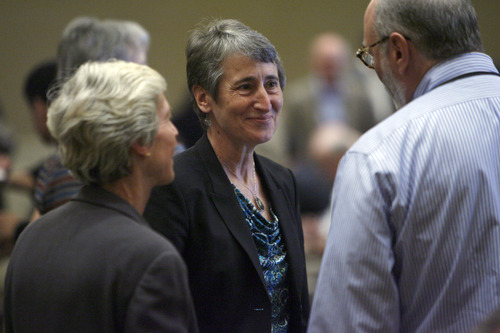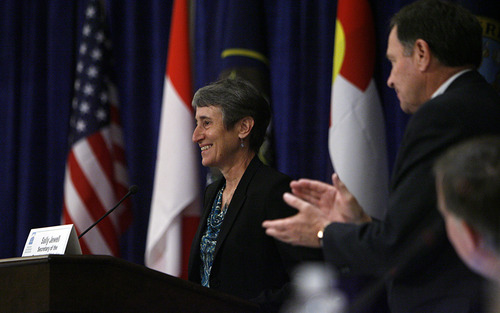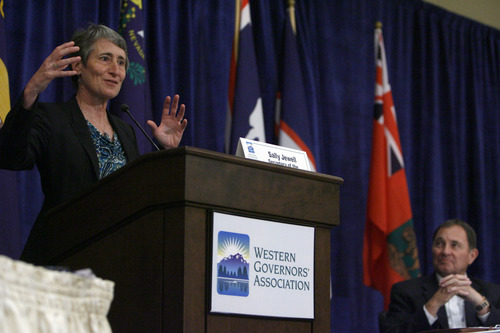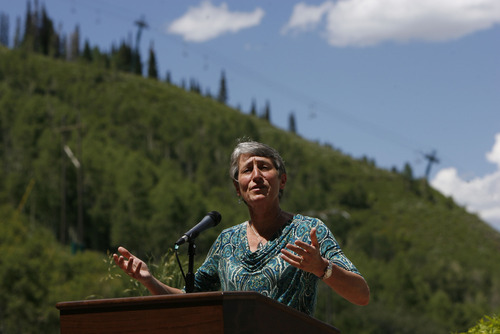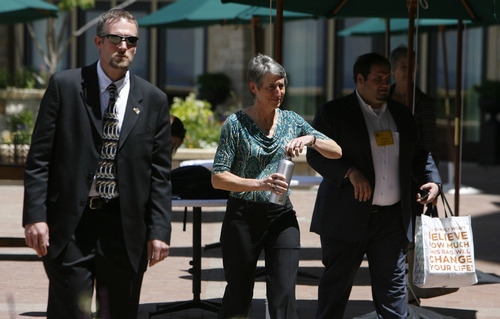This is an archived article that was published on sltrib.com in 2013, and information in the article may be outdated. It is provided only for personal research purposes and may not be reprinted.
Park City • New U.S. Interior Secretary Sally Jewell had just finished a call Friday for wise and balanced use of federal public lands when Utah Gov. Gary Herbert asked her a question.
"How do you define balance?" he asked. "Seventy percent of the land in Utah is owned by the federal government. To some people that's balanced. ... But balance is in the eye of the beholder."
"Defining balance begins by understanding each other," she replied during a convention of the Western Governors' Association, which is chaired by Herbert. Jewell vowed that federal land managers will seek to better understand local concerns and take them into account in decision-making.
She illustrated by saying she spent a lot of time in Moab in recent years and found that "balance in that community is having healthy national parks that are well-staffed." She said other places may focus on the need for grazing or mining — and added that some see the value of tourism to lands where development is restricted.
Balance, in Jewell's opinion, apparently does not include complying with Utah's demands to hand over title to federal lands in the state.
Asked in a news conference if she had any appetite for giving away control of land overseen by her department, Jewell said, "I would say there is appetite in the federal government to work with state governments to thoughtfully manage our land."
As an example, Jewell said Utah and other states have a checkerboard pattern of state and private lands within federal areas. "That is a very difficult way to manage land," so Interior is considering swaps to consolidate holdings. "We're working with states and are willing to look at those kinds of opportunities."
Still, Jewell said states should also realize "that just because land may be under the jurisdiction of the federal government doesn't mean that the states don't benefit from it."
She pointed to the ski runs in Park City as an example. "Park City benefits because in many cases it is a ski resort that is on federal [Forest Service] land," she said. "Obviously Park City exists because of the recreational opportunities that are around it. ... It's not negative necessarily to be federal."
Jewell assured in her news conference that the administration of President Barack Obama would not designate any new national monuments to protect proposed wilderness areas without consulting local communities. That worry persists after former President Bill Clinton formed the 1.7 million-acre Grand Staircase-Escalante National Monument with virtually no discussion with or warning to local communities.
She said she committed during her confirmation "that we would listen to people on the ground about what they want for the lands around their areas, what are the special places that they feel strongly should be conserved, what are the areas that have high potential for development."
Still, Herbert told reporters later that Utah's push for more control of public lands "is not going away" and is a response to federal "overreach."
Rep. Ken Ivory, R-West Jordan, a leader in the legislative movement to claim federal lands for states, said in an interview that, despite Jewell's assurances, he doesn't trust federal management of public lands.
"Why should we? We've got a federal government that's $1 trillion in the hole, it has $15 billion in deferred maintenance on federal lands right now and they are destroying the forests" with poor management, he said after listening to Jewell.
The Interior chief told the governors' association that she has a background that helps her understand the need for multiple use of federal lands, including working for an oil company, banks that helped ranchers with grazing, and heading the REI outdoor clothing and equipment company.
Jewell said that while many people may focus on wanting to make oil exploration or other development easier, she said states should also realize how much tourism and the outdoor recreation industries bring to their economy because of pristine areas.
"In Utah, Governor Herbert, it's $12 billion in spending and 122,000 jobs for outdoor recreation," she said.
Jewell noted that the outdoor recreation industry holds regular expositions here, and had threatened to move if Utah did not come up with better plans for protecting the outdoors and recreation.
"I compliment Governor Herbert for doing just that," she said. Jewell also praised Utah for advertising its national parks and developing tourism. "They are important engines for your economy."


